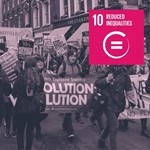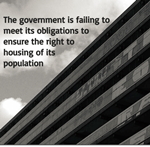United Kingdom
Published on Fri, 2020-10-16 11:50
A range of different forms of confinement and quarantine were implemented around the world in order to slow down the spread of the pandemic and avoid a collapse of overburdened health systems. In that process, low-paid services such as home deliveries, food processing, garbage collection and care-giving were identified as “essential”. In most comparatively affluent countries those services are largely provided by immigrants and yet, as reported from the UK by Imogen Richmond-Bishop of Just Fair, “COVID-19 has disproportionately affected migrant communities” through drops in income; limited access to welfare support; barriers for homeless migrants to access accommodation and overcrowded and substandard housing.” |
Published on Mon, 2019-11-18 14:08
Scientific evidence and data are not at all missing in the United Kingdom, where inequality continues to rise. “Human rights researchers and practitioners working in and on the UK generally have access to a large amount of relevant and detailed data, at least when compared with other countries” recognizes Just Fair, a group of economic and social rights campaigners. That is why they find it “all the more surprising” that the UK’s Voluntary National Review (VNR) 2019, fails to disaggregate the information. “To ensure that nobody is left behind and to provide a truly meaningful picture, the government must gather and present the evidence based on all the prohibited grounds of discrimination according to both international and domestic human rights law, and this includes income and wealth disparities.” Just Fair reports that “the UK is a highly unequal society. For example, life expectancy for women born in deprived areas has declined in recent years, something utterly unacceptable in the fifth largest world economy”. |
Published on Wed, 2018-11-21 10:26
In the United Kingdom, a consultation process coordinated by the UK network of Stakeholders for Sustainable Development (UKSSD) concludes that “inequality is projected to rise in the coming years”. Paradoxically, the unemployment rate is reaching an historical low, but “at the same time, tax and social security cuts introduced since 2012 have had a particularly severe effect on people on lower incomes. Black and ethnic minority households, families with at least one disabled member, and lone parents (who are overwhelmingly women) have suffered disproportionately”. A member of the network, Just Fair, led the drafting of the civil society chapter on SDG 10 on the reduction of inequality at the national level and highlights the fact that, thanks to the Equality Act of 2010, “authorities gather and transparently report useful disaggregated data”. Yet, successive governments have failed to implement this Act. The duty is in force in Scotland since April 2018, Wales has the power to follow suit, some councils are voluntarily implementing it and 78 Members of Parliament from five different parties are calling on the government to bring the duty into effect. |
Published on Wed, 2018-07-11 09:18
The UK Government committed to reducing inequalities through Sustainable Development Goal 10. Three years later things aren’t on track but is the socio-economic duty the solution we need? Koldo Casla from Just Fair explains. By signing up to the Sustainable Development Goals (SDGs) in 2015, among other things, the UK Government committed to reducing inequalities. The SDGs, with their 17 Goals and 169 Targets, set the world on a trajectory where we have eradicated poverty, reduced inequalities, halted the loss of biodiversity and combatted catastrophic climate change. Some call them an action plan for the world. But as our chapter on SDG 10 in Measuring up shows, three years later the UK’s chances of hitting the targets on reducing inequalities by 2030 are not looking too good. |
Published on Sun, 2017-08-20 23:08
The present and future of economic and social rights in the UK will depend considerably on the legal and policy consequences of the UK’s withdrawal from the European Union. In recent years, the UK has introduced significant changes to its welfare state with the Welfare Reform Act 2012 and the Welfare Reform and Work Act 2016. The reforms were justified on two grounds: deficit reduction and ending welfare dependency by facilitating access to work. |
Published on Thu, 2011-09-22 13:04
Sources: Transparency International, Financial Task Force, HumanRights.gov, Inesc
A group of government and civil society organizations from all over the planet, among them the Instituto de Estudos Socioeconômicos (Inesc, focal point of Social Watch in Brazil), launched this Wednesday in New York the Open Government Partnership (OGP), a multilateral initiative that aims to promote transparency, fight corruption, strengthen accountability and empower citizens. |
|
Source: Inter Press Service (IPS). Published on Wed, 2005-03-16 10:11
LONDON, Mar 15 (IPS) - A majority of British MPs have signed up for a resolution to make poverty history -- but not voted to take action on it. Their support comes through a parliamentary resolution that does not arise from within the parliament chamber. It comes by way of signing up to what is known as an Early Day Motion (EDM). Copies of the motion are placed in the House of Commons for MPs to sign up to, in the knowledge that these are not likely to be debated within Parliament. No EDM this year has drawn as much support as EDM number 9 tabled by Labour MP Julia Drown. |
|
Source: BBC. Published on Wed, 2004-12-01 16:38
One fourth of the British households are poor and the north-south divide is getting wider, claim British researchers. |
SUSCRIBE TO OUR NEWSLETTER








